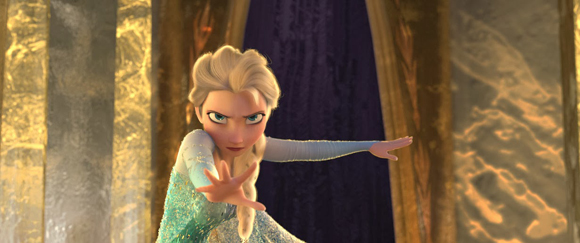Only Two of the 100 Top-Grossing Movies of the Year Were Directed by Women
Today in things that make us scream incoherently

We’ve written at length about how sexism and the film and TV industries negatively affects the number of women behind the screen, most noticeably when it comes to directing. Not that this it at all surprising, but the trend continued in 2013: Movies with female leads made bank, but of the 100 top-grossing movies of the year only two of them were directed by women.
Say that it’s because women must not want to direct as much as men do and I will spit fire at everything you love.
The two movies in question are Kimberly Peirce‘s Carrie and Frozen, co-directed by Chris Buck and Jennifer Lee. Lee broke the ice ceiling and became the first female to direct one of Disney’s princess movies, so we can chalk that into the “good things that happened in 2013” category. But the 98 other movies in the top 100: All directed by dudes. This continues the tradition from the last two years (and the entirety of Hollywood history); according to San Diego State University’s Center for the Study of Women in Television and Film only 5 and 9 percent of the top-grossing films were directed by women in 2011 and 2012, respectively.
There are a lot of reasons for this, but most of them can be wrapped up in a handy package the name of which rhymes with rinstitutionalized rexism. Women aren’t any less capable of directing movies than men. They come out of film school (or not) with the same experience, the same desire to make it in the industry. And yet female directors are often denied the same opportunities as their male counterparts.
To see that, you need look only at indie film. It’s demonstrably more friendly to female directors than Hollywood is; of the 10 top-grossing films directed by females in 2013 (numbers 3-10 are, in order: Enough Said, Peeples, Black Nativity, The Bling Ring, The To-Do List, In a World…, Austenland, Blackfish), all but Frozen and Carrie are indies. Tons of male directors get handed the reigns to big-budget films after having success with a low-budget indie, if that! There’s Godzilla (Gareth Edwards), Jurassic World (Colin Trevorrow), Tron: Legacy (Joseph Kosinski). They’re good, but they’re not well-known, so the studios can get them on the cheap. Where’s the female director being plucked from relative obscurity to direct some Hollywood reboot or sequel after scoring big with a festival hit? Why does a high level of success in the indie circuit—where I hypothesize gender isn’t so much of a barrier in part because things are 100 times harder across the board, plus there aren’t so many old white dudes in expensive suits serving as gatekeepers—not translate to big-budget opportunities the way it does for men?
Rinstitutionalized. Rexism.
(via: Variety)
- Study Releases Predictably Depressing Findings on the State of Female Directors in British TV
- Studio Head Offers Straight Talk On The Dismal State of Hollywood for Female Directors
- Are You a Female Who Wants to Make Movies? You’ll Have Better Luck If You Stay Of of Hollywood
Are you following The Mary Sue on Twitter, Facebook, Tumblr, Pinterest, & Google +?
Have a tip we should know? tips@themarysue.com